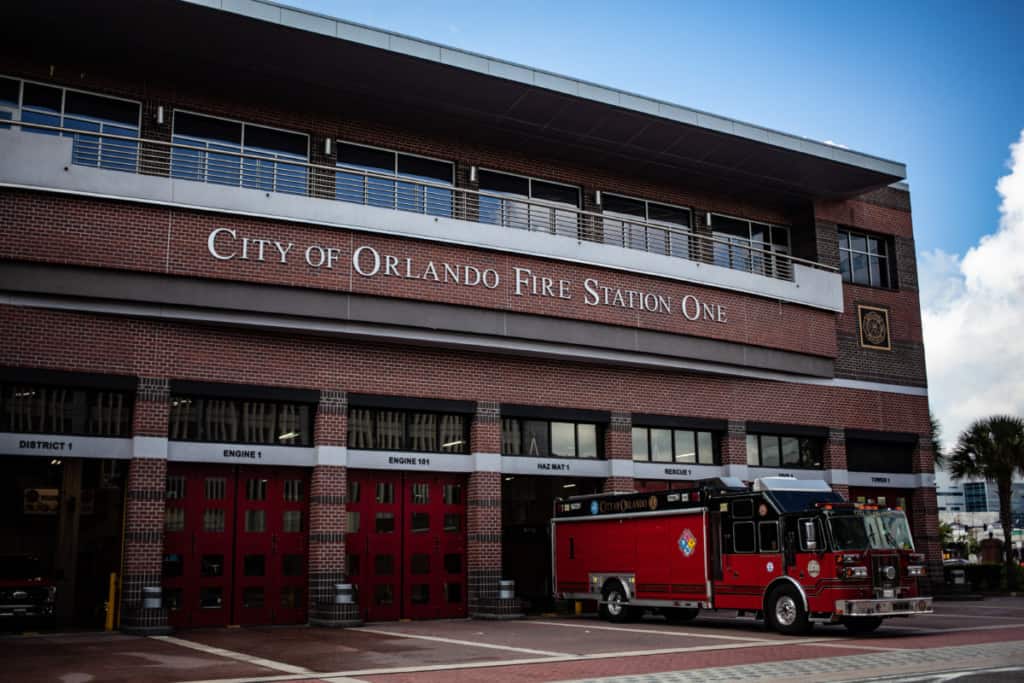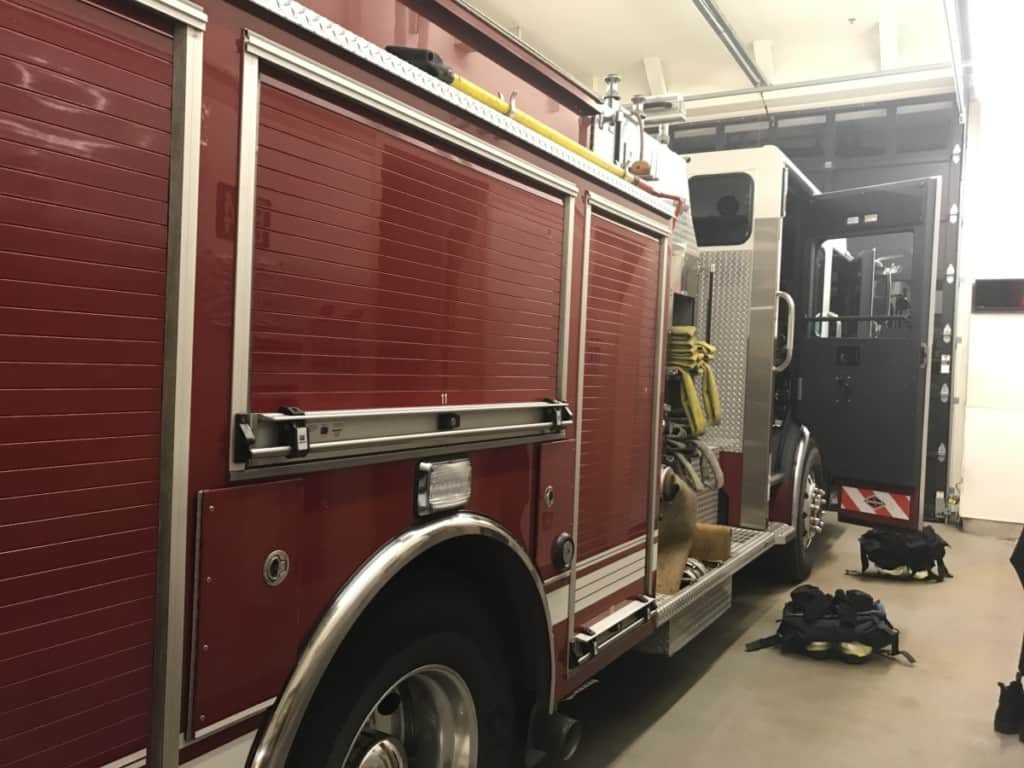As you probably already know, firefighters are part of the emergency services and thus, part of their job is to respond to 911 calls (or other emergency numbers in other countries). But have you ever wondered how firefighters receive these 911 calls in the first place? Well, it’s quite straightforward, and here is everything you need to know about 911 calls.
Firefighters receive emergency 911 calls via a call center operation which uses highly trained dispatchers to determine what the emergency is and how it should be best responded to. When they have gained this information, they will then pass the call on to the appropriate fire station.
The 9-1-1 system allows for trained professionals, like firefighters, to respond to emergency calls for service in the US, Canada, Mexico, and parts of South America. However, if they are never alerted when their is an emergency, than can’t be much help. So, let’s take a look at the basics of how this system works.
Your # 1 priority is keeping your family safe. As a firefighter, I recommend everyone has updated smoke detectors that don’t require battery changes, like these ones from Kidde, a fire extinguisher, like this one from Amerex, and a fire escape ladder if you have bedrooms above the first floor, I recommend this one from Hausse.
Also read: How Do Firefighters Know When There is a Fire?
What Is 911?

The purpose of 9-1-1, or 911 depending on how you want to write it, is to provide the public with an easy to remember phone number that can be dialed from nearly any phone (in fact, most cellular phones can call 9-1-1 even if there is no SIM card inside them – but you can’t dial 911 on Skype) to get emergency services to respond to an incident.
It is important to remember that the purpose of 911 is to provide support in emergencies, calling 9-1-1 when the issue is not an emergency can result in the delay of other calls with real emergencies and may cost lives or property.
Also read: Does 911 Cost Money? The Price of Emergency Calls
Where Do 911 Calls Go?
When someone calls 911, they may be facing a wide range of potential emergency situations – they might need the fire service and/or the police service and/or emergency medical care. Thus, the call is routed to a call center with emergency dispatch staff who are professionally trained to take 911 calls.
When a call arrives at the center it is answered by one of these staff members who will then proceed to try and take information about the incident from the caller in a structured fashion – they will want to know what the emergency is, where it is happening, who can be contacted at the scene, etc.
They will then use this information for two purposes:
- The first will be to decide on which emergency services to alert and in which order to do so
- Secondly, to offer some level of prioritization to the call (deciding how severe the call is and the priority in which it needs to be responded to)
Also read: What Is A Code 4? Firefighter Radio Codes
How Do Firefighters Get Alerted Of A Call?
When the 911 operator has determined that the fire department needs to be involved, they will contact the appropriate station (nearest to the emergency that has the necessary equipment) and transmit all the data that the fire service needs to effectively respond to the call.
Multiple resources from different agencies or stations may be needed and they will all be alerted as necessary.
Here is a demo of what the fire station alert system may look and sound like:
What Happens When Firefighters Get A Call?
When the fire station receives a call, it will then alert the appropriate firefighters. This is usually done via a broadcast alert system within the fire station and on the firefighter’s radios.
This usually means an alarm or tones go off throughout the station. It will also frequently turn on many of the station lights, to make sure everyone is alerted. They are expected to respond to these calls very rapidly.
The firefighters may get a printout or information on a mobile computer or tablet. This will usually include the type of emergency (structure fire, car fire, medical call, fire alarm, lift assist, hazardous materials leak, etc.) as well as the location of the call.
They will dress appropriately for the call and then head to the scene. When they arrive on the scene their first priority is to ensure the safety of themselves, their crew, and members of the public while working to help those in need and mitigate any emergencies.
Here is an example of what firefighters do when they get a call:
They may, depending on the priority of the call, use their sirens and lights to help them to get to an incident more quickly (called a Code 3 response).
However, it is only under unusual circumstances that emergency vehicles will break the speed limit or rules of the road – such behavior is dangerous and may result in an injury or death to the firefighters or the public and would only delay the response to the emergency.
If the incident is a fire, when they arrive, they will secure the scene and people within it, then they will put out the fire and then they may help to assess the damage caused.
In the event of responding to a medical emergency (many firefighters are fully qualified EMTs or paramedics and when they are not fighting fires they are routinely tasked to attend medical emergencies) firefighters will seek to ensure the health and wellbeing of any injured or sick patients.
Also read: Do Firefighters Have to Be Paramedics or EMTs? and Why Do Firefighters Go to Medical Calls?
Can You And Should You Call A Fire Department Directly?
Yes, you can call the fire department directly. In fact, in many cases you very well should call a fire department directly.
Remember when we said at the start that 911 is for emergencies? If you need your local fire department and it’s not an emergency – call them direct. You can find a direct phone number on the local fire department website.
When Should You Call 9-1-1?
OK, so let’s just run through the list of good reasons to call 9-1-1 because it can be a bit confusing to know what exactly we mean by “emergency”:
- In the event of smoke or fire. It is always better to be safe than sorry when it comes to incidents involving actual fire. Even if you think you can tackle the blaze, you should call the firefighters as a backup because they can help with the aftermath. Fire is a clear emergency situation.
- If you think someone’s life is in danger. This should be fairly clear as well. If someone is sick or injured or there is a risk of them becoming severely injured (they might be trapped in a burning car, for example) then this is an emergency situation. You can call 9-1-1 without hesitation.
- When someone faints or collapses or is unconscious. Nobody expects you to be a doctor and to diagnose what is wrong with someone in this position. It might be that they’ve just had a little rush of blood but it might also be a stroke or a heart attack. So, call the emergency services and let them handle it, that’s their job.
- If someone has chest pain or pressure. Severe chest pains can be the warning signs of a major heart attack. Again, there’s no need for you to play doctor, you probably don’t have as much experience in CPR, etc. as a paramedic so call 9-1-1 anyway.
- If someone has shortness of breath or difficulty breathing. Breathing issues can be life-threatening. Don’t even think about it, call 9-1-1.
- If someone’s speech becomes slurred or there is evidence of bodily or facial paralysis of any kind. This is the top warning sign that someone has had a stroke. Get on the phone to the emergency services.
- If there is a traffic accident that has resulted in an injury. The forces involved in traffic accidents can be huge and even if an injury appears to be trivial there might be a lot more damage inside. Get the paramedics out to take a look and they’ll probably need the police and usually the fire department too. That’s why 9-1-1 exists to work out who to involve.
If you’re still not certain whether you should call 9-1-1 then consider?
- If I move the victim, could this cause them further harm?
- Is the patient’s life in danger in any way?
- Could this use the skills of qualified medic of some form?
- Would taking this person to a hospital result in delays due to distance or the current traffic conditions?
- If you move the person and take them to hospital could their condition become more serious?
If the answer to any of the above is “yes” then call 911.
Also read: What Happens When You Accidentally Call 911? Important Info
When Should You Avoid Calling 9-1-1?
There are also some fairly clear scenarios when calling 9-1-1 is inappropriate:
- You need a ride to a doctor’s office or the hospital – this is what taxis are for
- You want to use a fire hydrant – if there’s no fire, call the non-emergency line for your fire department
- You have cold or flu symptoms – go to the hospital or your doctor
- You want medical advice – call a hospital or your doctor
- You have a cat stuck in a tree – call the non-emergency line for your fire department if you really must, but it would be better to call animal control or just to leave some food for it at the bottom of the tree
- You have a power outage – this is something you take up with the power company (unless someone in your house is dependant on electricity for medical equipment)
But remember, when in doubt about whether or not you should call 9-1-1, you should call. It is always better to be safe and let the professionals decide.
Conclusion
How do firefighters receive 9-1-1 calls? They will get their calls via a call center operator who has been trained to effectively handle these calls and to get the right information from the caller to appropriately respond to the call.
Please remember that you should only phone 911 in the event of an emergency, there are non-emergency numbers for your local fire service for other enquiries. Making the right call can help to save lives.
Related Articles:
What Is The Role Of A First Responder?
Should You Open Windows During A Fire? Is It A Good Idea?

